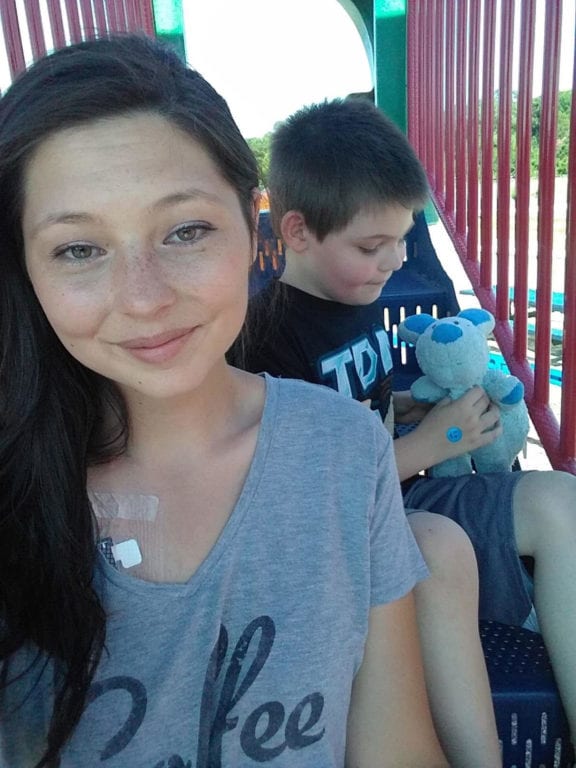My name is Lindsay Fogarty. I am a 25-year-old single mother to a wonderful 6, almost 7-year-old son, named Andrew.
As I am writing this I am listening to the not-so-quiet, but rhythmic hum of the pump that is attached to the IV pole in my bedroom. The pump is running an infusion through my chest port, a type of central line that goes directly to my heart and runs through my veins. I do this six days a week and enjoy my one solitary day without it, with only with IV medication.
I have multiple conditions, some that are rare and some that are not.
Most important to name are vascular Ehlers-Danlos syndrome, gastroparesis, and postural orthostatic tachycardia syndrome (POTS).
Three rare or little-known diseases that have taken so much from me physically, but have given me an entirely new perspective that I am extremely thankful for.
I have felt my heart shatter each time I have sat across from doctor after doctor, alone as they told me I have a disease, syndrome, or heath condition with no cure. I felt numb to their words, as the echo of “symptom management” rang through different specialty offices. Postural orthostatic tachycardia syndrome is a form of dysautonomia; it was my first diagnosis two years ago. The cardiologist who diagnosed me has since retired, yet I still hold a great deal of respect for him because he was the very first doctor to listen to my symptoms and not dismiss them.
I was dismissed by every doctor I saw until my son was diagnosed with mastocytosis at the age of 3 and I was able to add it to my family health history.
My sons’ diagnosis was the key to unlocking my lifetime questions of health issues. Mastocytosis is a rare mast cell disease and a co-morbid condition to Ehlers-Danlos syndrome. It was first thought that I had hypermobile Ehlers-Danlos syndrome until my geneticist looked closer at my large family history with my own health history and decided that I needed to be tested for the vascular form. I was told that my genetic results would take seven weeks to come back. When I saw my geneticist calling only 12 days after my blood work was taken, I had tears in my eyes as I answered the phone and knew that this diagnosis was different than all the others that had come before.

My health has languished in the last two years, more than I or anyone else imagined possible. I was a store manager at a major drug store, and a pharmacy technician. Now, I cannot walk very far, between random joint dislocations, ligament tears, chronic pain and chronic fatigue, I rely heavily on mobility aids. I faint frequently, experience pre-syncope and cannot tolerate the heat. I can eat one meal a day usually, and two on good days. I experience a wide variety of symptoms that change in their severity, because taking care of one condition usually means another is suffering. Most importantly, I do not have the ability to drink water. Two conditions, gastroparesis and small fiber neuropathy, took that away from me.
I am so grateful for the medical advancements and technology of today, because without them I would not be here. I live under odd circumstances, but I am alive. I live on my bad days and I thrive on my good days. I have chosen to try to bring vitality to my life by advocating for rare disease communities. I wake up each day with purpose and I am thankful for each moment I have with my son. He is my driving force and reason. It is my responsibility to show him that life is possible with rare disease. Life is not always happy moments, but I am happy and life is beautiful nonetheless.
Share this rare disease story and let us know your rare disease experience today.
Check out our partners, the Dysautonomia Advocacy Foundation and the Ehlers-Danlos Society!


